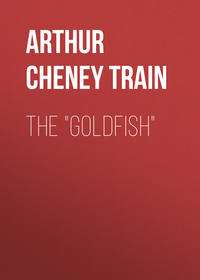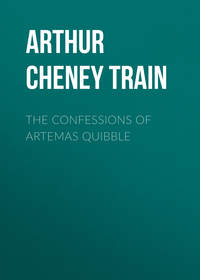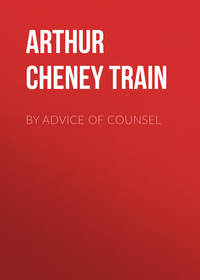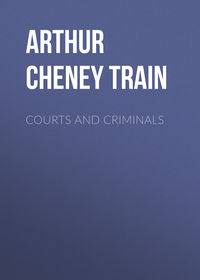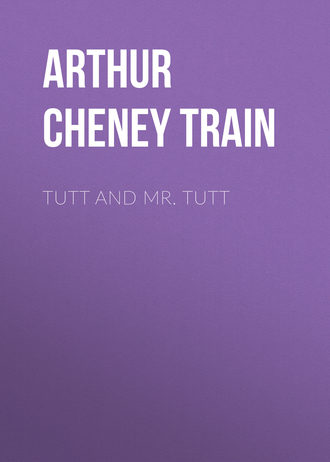 полная версия
полная версияTutt and Mr. Tutt
Mock looked at Murtha, who was carrying the terrapin.
"Sure!" he called back. "Sit down, boys. What'd yer want? Can't yer tell a feller?"
"We want you for croaking Quong Lee!" snapped Mooney. "Where have you been?"
"Fulton Market—and Hudson House. I left here quarter of four. I haven't seen Quong Lee. Where was he killed?"
Mooney laughed sardonically.
"That'll do for you, Mock! Your alibi ain't worth a damn this time. I saw you myself."
"You saw someone else," Mock assured him politely. "I haven't been in Chinatown."
"Say, what yer doin' wit' my Chink?" demanded Emma, appearing in the doorway. "He was sittin' here wit' me all the afternoon, until about just before four I sent him over to Fulton Market to buy a bird. Who's been croaked, eh?"
"Aw, cut it out, Emma!" replied Mooney. "That old stuff won't go here. Your Chink's goin' to the chair. Murtha, look through the place while we put Mock in the wagon. Hell!" he added under his breath. "Won't this make Peckham sick!"
Mr. Ephraim Tutt just finished his morning mail when he was informed that Mr. Wong Get desired an interview. Though the old lawyer did not formally represent the Hip Leong Tong he was frequently retained by its individual members, who held him in high esteem, for they had always found him loyal to their interests and as much a stickler for honor as themselves. Moreover, between him and Wong Get there existed a curious sympathy as if in some previous state of existence Wong Get might have been Mr. Tutt, and Mr. Tutt Wong Get. Perhaps, however, it was merely because both were rather weary, sad and worldly wise.
Wong Get did not come alone. He was accompanied by two other Hip Leongs, the three forming the law committee appointed to retain the best available counsel to defend Mock Hen. In his expansive frock coat and bowler hat Wong might easily have excited mirth had it not been for the extreme dignity of his demeanor. They were there, he stated, to request Mr. Tutt to protect the interests of Mock Hen, and they were prepared to pay a cash retainer and sign a written contract binding themselves to a balance—so much if Mock should be convicted; so much if acquitted; so much if he should die in the course of the trial without having been either convicted or acquitted. It was, said Wong Get gently, a matter of grave importance and they would be glad to give Mr. Tutt time to think it over and decide upon his terms. Suppose, then, that they should return at noon? With this understanding, accordingly, they departed.
"There's no point in skinning a Chink just because he is a Chink," said the junior Tutt when his partner had explained the situation to him. "But it isn't the highest-class practise and they ought to pay well."
"What do you call well?" inquired Mr. Tutt.
"Oh, a thousand dollars down, a couple more if he's convicted, and five altogether if he's acquitted."
"Do you think they can raise that amount of money?"
"I think so," answered Tutt. "It might be a good deal for an individual Chink to cough up on his own account, but this is a coöperative affair. Mock Hen didn't kill Quong Lee to get anything out of it for himself, but to save the face of his society."
"He didn't kill him at all!" declared Mr. Tutt, hardly moving a muscle of his face.
"Well, you know what I mean!" said Tutt.
"He wasn't there," insisted Mr. Tutt. "He was way over in Fulton Market buying a terrapin."
"That is what, if I were district attorney, I should call a Mock Hen with a mockturtle defense!" grunted Tutt.
Mr. Tutt chuckled.
"I shall have to get that off myself at the beginning of the case, or it might convict him," he remarked. "But he wasn't there—unless the jury find that he was."
"In which case he will—or shall—have been there—whatever the verb is," agreed Tutt. "Anyhow they'll tax every laundry and chop-suey palace from the Bronx to the Battery to pay us."
"I'd hate to take our fee in bird's-nest soup, shark's fin, bamboo-shoots salad and ya ko main," mused Mr. Tutt.
"Or in ivory chopsticks, oolong tea, imitation jade, litchi nuts and preserved leeches!" groaned Tutt. "Be sure and get the thousand down; it may be all the cash we'll ever see!"
Promptly at twelve the law committee of the Hip Leong Tong returned to the office of Tutt & Tutt. With them came a venerable Chinaman in native costume, his wrinkled face as inscrutable as that of a snapping turtle. The others took chairs, but this high dignitary preferred to sit upon his heels on the floor, creating something of the impression of an ancient slant-eyed Buddha.
Wong Get translated for his benefit the arrangement proposed by Mr. Tutt, after which there was a long pause while His Eminence remained immovable, without even the flicker of an eyelid. Then he delivered himself in an interminable series of gargles and gurgles, supplemented by a few cough-like hisses, while Wong Get translated with rapid dexterity, running verbally in and out among his words like a carriage dog between the wheels of a vehicle.
It was, declared Buddha, an affair of great moment touching upon and appertaining to the private honor of the Duck, the Wong, the Fong, the Long, the Sui and various other families, both in America and China. The life of one of their members was at stake. Their face required that the proceedings should be as dignified as possible. The price named by Mr. Tutt was quite inadequate.
Mr. Tutt, repressing a smile, passed a box of stogies. What amount, he inquired through Wong Get, would satisfy the face of the Duck family? A somewhat lengthy discussion ensued. Then Buddha rendered his decision.
The honor of the Ducks, Longs and Fongs would not be satisfied unless Mr. Tutt received five thousand dollars down, five more if Mock Hen was convicted, three more if he died before the conclusion of the trial, and twenty thousand if he was acquitted.
Mr. Tutt, assuming an equal impassivity, pondered upon the matter for about an inch of stogy and then informed the committee that the terms were eminently satisfactory. Buddha thereupon removed from the folds of his tunic a gigantic roll of soiled bills of all denominations and carefully counting out five thousand dollars placed it upon the table.
"H'm!" remarked Tutt when he learned of the proceeding. "His face is our fortune!"
"Look here," expostulated District Attorney Peckham in his office to Mr. Tutt a month later. "What's the use of our both wasting a couple of weeks trying a Chinaman who is bound to be convicted? Your time's too valuable for that sort of thing, and so is mine. We've got three white witnesses that saw him do it, and a couple of dozen Chinks besides. He doesn't stand a chance; but just because he is a Chink, and to get the case out of the way, I'll let you plead him to murder in the second degree. What do you say?"
He tried to conceal his anxiety by nervously lighting a cigar. He would have given a year's salary to have Mock Hen safely up the river, even on a conviction for manslaughter in the third, for the newspapers were making his life a burden with their constant references to the seeming inability of the police department and district attorney's office to prevent the recurrence of feud killings in the Chinatown districts. What use was it, they demanded, to maintain the expensive machinery of criminal justice if the tongs went gayly on shooting each other up and incidentally taking the lives of innocent bystanders? Wasn't the law intended to cover Chinamen as much as Italians, Poles, Greeks and niggers? And now that one of these murdering Celestials had been caught red-handed it was up to the D.A. to go to it, convict him, and send him to the chair! They did not express themselves precisely that way, but that was the gist of it. But Peckham knew that it was one thing to catch a Chinaman, even red-handed, and another to convict him. And so did Mr. Tutt.
The old lawyer smiled blandly—after the fashion of the Hip Leong Tong. Of course, he admitted, it would be much simpler to dispose of the case as Mr. Peckham suggested, but his client was insistent upon his innocence and seemed to have an excellent alibi. He regretted, therefore, that he had no choice except to go to trial.
"Then," groaned Peckham, "we may as well take the winter for it. After this there's going to be a closed season on Chinamen in New York City!"
Now though it was true that Mock Hen insisted upon his innocence, he had not insisted upon it to Mr. Tutt, for the latter had not seen him. In fact, the old lawyer, recognizing what the law did not, namely that a system devised for the trial and punishment of Occidentals is totally inadequate to cope with the Oriental, calmly went about his affairs, intrusting to Mr. Bonnie Doon of his office the task of interviewing the witnesses furnished by Wong Get. There was but one issue for the jury to pass upon. Quong Lee was dead and his honorable soul was with his illustrious ancestors. He had died from a single blow upon the head, delivered with an iron bar, there present, to be in evidence, marked "Exhibit A." Mock Hen was alleged to have done the deed. Had he? There would be nothing for Mr. Tutt to do but to cross-examine the witnesses and then call such as could testify to Mock's alibi. So he made no preparation at all and dismissed the case from his mind. He had hardly seen a dozen Chinamen in his life—outside of a laundry.
On the morning set for the trial Mr. Tutt, having been delayed by an accident in the Subway, entered the Criminal Courts Building only a moment or two before the call of the calendar. Somewhat preoccupied, he did not notice the numerous Chinamen who dawdled about the entrance or the half dozen who crowded with him into the elevator, but when Pat the elevator man called, "Second floor!—Part One to your right!—Part Two to the left!" and he stepped out into the marble-floored corridor that ran round the inside of the building, he was confronted with an unusual and somewhat ominous spectacle.
The entire hallway on two sides of the building was lined with Chinamen! They sat there motionless as blue-coated images, faces front, their hands in their laps, their legs crossed beneath them. If anyone appeared in the offing a couple of hundred pairs of glinting eyes shifted automatically and followed him until he disappeared, but otherwise no muscle quivered.
"Say," growled Hogan, Judge Bender's private attendant, who was the first to run the gantlet, "those Chinks are enough to give you the Willies! Their eyes scared me to death, sticking me through the back!"
Even dignified Judge Bender himself as he stalked along the hall, preceded by two police officers, was not immune from a slight feeling of uncanniness, and he instinctively drew his robe round his legs that it might not come into contact with those curious slippers with felt soles that protruded across the marble slabs.
"Eyes right!" They had picked him up the instant he stepped out of the private elevator—the four hundred of them. If he turned and looked they were seemingly not watching him, but if he dropped his glance they swung back in a single moment and focused themselves upon him. And every one of them probably had a gun hidden somewhere in his baggy pants! The judge confessed to not liking these foreign homicide cases. You never could tell what might happen or when somebody was going to get the death sign. There was Judge Deasy—he had the whole front of his house blown clean out by a bomb! That had been a close call! And these Chinks—with their secret oaths and rituals—they'd think nothing at all of jabbing a knife into you. He didn't fancy it at all and, as he hurried along, supremely conscious of the deadly cumulative effect of those beady eyes, he fancied it less and less. What was there to prevent one of them from getting right up in court and putting a bullet through you? He shivered, recalling the recent assassination of a judge upon the bench by a Hindu whom he had sentenced. When he reached his robing room he sent for Captain Phelan.
"See here, captain," he directed sharply, "I want you to keep all those Chinamen out in the corridor; understand?"
"I've got to let some of 'em in, judge," urged Phelan. "You've got to have an interpreter—and there's a Chinese lawyer associated with Tutt & Tutt—and of course Mr. O'Brien has to have a couple of 'em so's he'll know what's going on. Y' see, judge, the On Gee Tong is helping the prosecution against the Hip Leongs, so both sides has to be more or less represented."
"Well, make sure none of 'em is armed," ordered Judge Bender. "I don't like these cases."
Now the judge, being recently elected and unfamiliar with the situation, did not realize that nothing could have been farther from the Oriental mind or intention than an attack upon the officers engaged in the administration of local justice, whom they regarded merely as nuisances. What these Chinamen supremely desired was to be allowed to settle their own affairs in their own historic and traditional way—the way of the revolver, the silken cord, the knife and the iron bar. Once enmeshed in Anglo-Saxon juridical procedure, to be sure, they were not averse to letting it run its course on the bare chance that it might automatically accomplish their revenge. But they distrusted it, being brought up according to a much more effective system—one which when it wanted to punish anybody simply reached out, grabbed him by the pigtail, yanked him to his knees and sliced off his head. This so-called American justice was all talk—words, words, words! From their point of view judges, jurymen and prosecutors were useless pawns in life's game of chess. Perhaps they are! Who knows!
When Judge Bender entered the court room it was, in spite of his injunction, full of blue blouses. A special panel of two hundred talesmen filled the first half dozen rows of benches, the others being occupied by witnesses both Chinese and white, policemen and the miscellaneous human flotsam and jetsam that always manages somehow or other to find its way to a murder trial. Inside the rail O'Brien, the assistant district attorney, was busy in conversation with three cueless Chinamen in American clothes. At the bar sat Mock Hen with Mr. Tutt beside him, flanked by Wong Get, Tutt, Bonnie Doon and Buddha.
The judge beckoned Mr. Tutt and O'Brien to the front of the bench.
"Is there any chance of disposing of this case by a plea?" he inquired.
O'Brien looked expectantly at Mr. Tutt, who shook his head. The judge shrugged his shoulders.
"Well, how long is it going to take?"
"About six weeks," answered the old lawyer quietly.
"What!" ejaculated judge and prosecutor in unison.
"A day or two less, perhaps," affirmed Mr. Tutt, "but, likely as not, considerably longer."
"I shall cut it down as much as I can," announced the judge, appalled at the prospect. "I shall not permit this trial to be dragged out indefinitely."
"Nothing would please me better, Your Honor," said Mr. Tutt with the shadow of a smile. "Shall we proceed to select the jury?"
The accuracy of Mr. Tutt's prophecy as to the probable length of the trial was partially demonstrated when it developed that most of the talesmen had a pronounced antipathy to Chinese murder cases, and a deep-rooted prejudice against the race as a whole. In fact, a certain subconscious influence affecting most of them was formulated by the thirty-ninth talesman to be rejected, who, in a moment of resentment, burst forth, "I don't mind trying decent American criminals, but I hold it isn't any part of a citizen's duty to try Chinamen!" and was promptly struck off the jury list.
"I say, chief," disgustedly declared O'Brien to Peckham at the noon recess as they clinked glasses over the bar at Pont's, "you've handed me a ripe, juicy Messina all right! I won't be able to get a jury. We've been at it since ten o'clock and we haven't lured a single sucker into the box!"
"What's the matter?" inquired the D.A. apprehensively.
"I can't quite make out," answered O'Brien. "But most of 'em seem to have a sort of idea that to kill a Chinaman ain't a crime but a virtue!"
"Well, don't tell anybody," whispered Peckham, "but I'm somewhat of that way of thinking myself. Set 'em up again, John!"
However, by invoking the utmost celerity a jury was at last selected and sworn at the end of the nineteenth day of the trial. As a jury O'Brien confidentially admitted to Peckham it wasn't much! But what could you expect of a bunch who were willing to swear that they hadn't any prejudice against a Chink and would as soon acquit him as a white man? The truth was that they were all gentlemen who, having lost their jobs, were willing to swear to anything that would bring them in two dollars a day. The more days the better! And it is historic fact that during the sixty-nine days of Mock Hen's prosecution not one of them protested at being kept away from his wife and children, his business or his pleasure. On the contrary they all slumbered peacefully from ten until four—and when the trial ended, on the whole they rather regretted that it was over, the only genuine opinion regarding the case being that the Chinks were all as funny as hell and that Mr. Tutt was a bully old boy.
The evidence respecting the death of the unfortunate Quong Lee made little impression upon them. Seemingly they regarded the story much as they did that of Elisha and the bears or Bel and the dragon—as a sort of apocryphal narrative which they were required to listen to, but in no wise bound to believe. They were much interested in Quong's suit of chain mail, however, and from time to time awoke to enjoy the various verbal encounters between the judge and Mr. Tutt. As factors in the proceedings they did not count, except to receive their two dollars per diem, board, lodging and hack fare.
The trial of Mock Hen being conducted in a foreign language, the first judicial step was the swearing of an interpreter. The On Gees had promptly produced one, whom O'Brien told the court was a very learned man; a graduate of the Imperial University at Peking, and a Son of the Sacred Dragon. Be that as it may, he was not prepossessing in his appearance and Mr. Tutt assured Judge Bender that far from being what the district attorney pretended, the man was a well-known gambler, who made his living largely by blackmail. He might be a son of a dragon or he might not; anyway he was a son of Belial. An interpreter was the conduit through which all the evidence must pass. If the official were biased or corrupt the testimony would be distorted, colored or suppressed.
Now he—Mr. Tutt—had an interpreter, the well-known Dr. Hong Su, against whom nothing could be said, and upon whose fat head rested no imputation of partiality; a graduate of Harvard, a writer of note, a—
O'Brien sprang to his feet: "My interpreter says your interpreter is an opium smuggler, that he murdered his aunt in Hong Kong, that he isn't a doctor at all, and that he never graduated from anything except a chop-suey joint," he interjected.
"This is outrageous!" cried Mr. Tutt, palpably shocked at such language.
"Gentlemen! Gentlemen!" groaned Judge Bender. "What am I to do? I don't know anything about these men. One looks to me about the same as the other. The court has no time to inquire into their antecedents. They may both be learned scholars or they may each be what the other says he is—I don't know. But we've got to begin to try this case sometime."
It was finally agreed that in order that there might be no possible question of partiality there should be two interpreters—one for the prosecution and one for the defense. Both accordingly were sworn and the first witness, Ah Fong, was called.
"Ask him if he understands the nature of an oath," directed O'Brien.
The interpreter for the state turned to Ah Fong and said something sweetly to him in multitudinous words.
Instantly Doctor Su rose indignantly. The other interpreter was not putting the question at all, but telling the witness what to say. Moreover, the other interpreter belonged to the On Gee Tong. He stood waving his arms and gobbling like an infuriated turkey while his adversary replied in similar fashion.
"This won't do!" snapped the judge. "This trial will degenerate into nothing but a cat fight if we are not careful." Then a bright idea suggested itself to his Occidental mind. "Suppose I appoint an official umpire to say which of the other two interpreters is correct—and let them decide who he shall be?"
This proposition was received with grunts of satisfaction by the two antagonists, who conferred together with astonishing amiability and almost immediately conducted into the court room a tall, emaciated Chinaman who they alleged was entirely satisfactory to both of them. He was accordingly sworn as a third interpreter, and the trial began again.
It was observed that thereafter there was no dispute whatever regarding the accuracy of the testimony, and as each interpreter was paid for his services at the rate of ten dollars a day it was rumored that the whole affair had been arranged by agreement between the two societies, which divided the money, amounting to some eighteen hundred dollars, between them. But, as O'Brien afterward asked Peckham, "How in thunder could you tell?"
The court's troubles had, however, only begun. Ah Fong was a whimsical-looking person, who gave an impression of desiring to make himself generally agreeable. He was, of course, the star witness—if a Chinaman can ever be a star witness—and presumably had been carefully schooled as to the manner in which he should give his testimony. He and he alone had seen the whole tragedy from beginning to end. He it was, if anybody, who would tuck Mock Hen comfortably into his coffin.
The problem of the interpreters having been solved Fong settled himself comfortably in the witness chair, crossed his hands upon his stomach and looked complacently at Mock Hen.
"Well, now let's get along," adjured His Honor. "Swear the witness."
Mr. Tutt immediately rose.
"If the court please," said he, "I object to the swearing of the witness unless it is made to appear that he will regard himself as bound by the oath as administered. Now this man is a Chinaman. I should like to ask him a preliminary question or two."
"That seems fair, Mr. O'Brien," agreed the court. "Do you see any reason why Mr. Tutt shouldn't interrogate the witness?"
"Oh, let me qualify my own witness!" retorted O'Brien fretfully. "Ah Fong, will you respect the oath to testify truthfully, about to be administered to you?"
The interpreter delivered a broadside of Chinese at Ah Fong, who listened attentively and replied at equal length. Then the interpreter went at him again, and again Ah Fong affably responded. It was interminable.
The two muttered and chortled at each other until O'Brien, losing patience, jumped up and called out: "What's all this? Can't you ask him a simple question and get a simple answer? This isn't a debating society."
The interpreter held up his hand, indicating that the prosecutor should have patience.
"Ah-ya-ya-oo-aroo-yung-ung-loy-a-a-ya oo-chu-a-oy-ah-ohay-tching!" he concluded.
"A-yah-oy-a-yoo-oy-ah-chuck-uh-ung-loy-oo-ayah-a-yoo-chung-chung-szt- oo-aha-oy-ou-ungaroo—yah-yah-yah!" replied Ah Fong.
"Thank heaven, that's over!" sighed O'Brien.
The interpreter drew himself up to his full height.
"He says yes," he declared dramatically.
"It's the longest yes I ever heard!" audibly remarked the foreman, who was feeling his oats.
"Does not that satisfy you?" inquired the court of Mr. Tutt.
"I am sorry to say it does not!" replied the latter. "Mr. O'Brien has simply asked whether he will keep his oath. His reply sheds no light on whether his religious belief is such that it would obligate him to respect an oath."
"Well, ask him yourself!" snorted O'Brien.
"Ah Fong, do you believe in any god?" inquired Mr. Tutt.
"He says yes," answered the interpreter after the usual interchange.
"What god do you believe in?" persisted Mr. Tutt.
Suddenly Ah Fong made answer without the intervention of the interpreter.
"When I in this country," he replied complacently in English, "I b'lieve Gees Clist; when I in China I b'lieve Chinese god."
"Does Your Honor hold that an obliging acquiescence in local theology constitutes such a religious belief as to make this man's oath sacred?" inquired Mr. Tutt.
The judge smiled.


